Watchlist March 2024
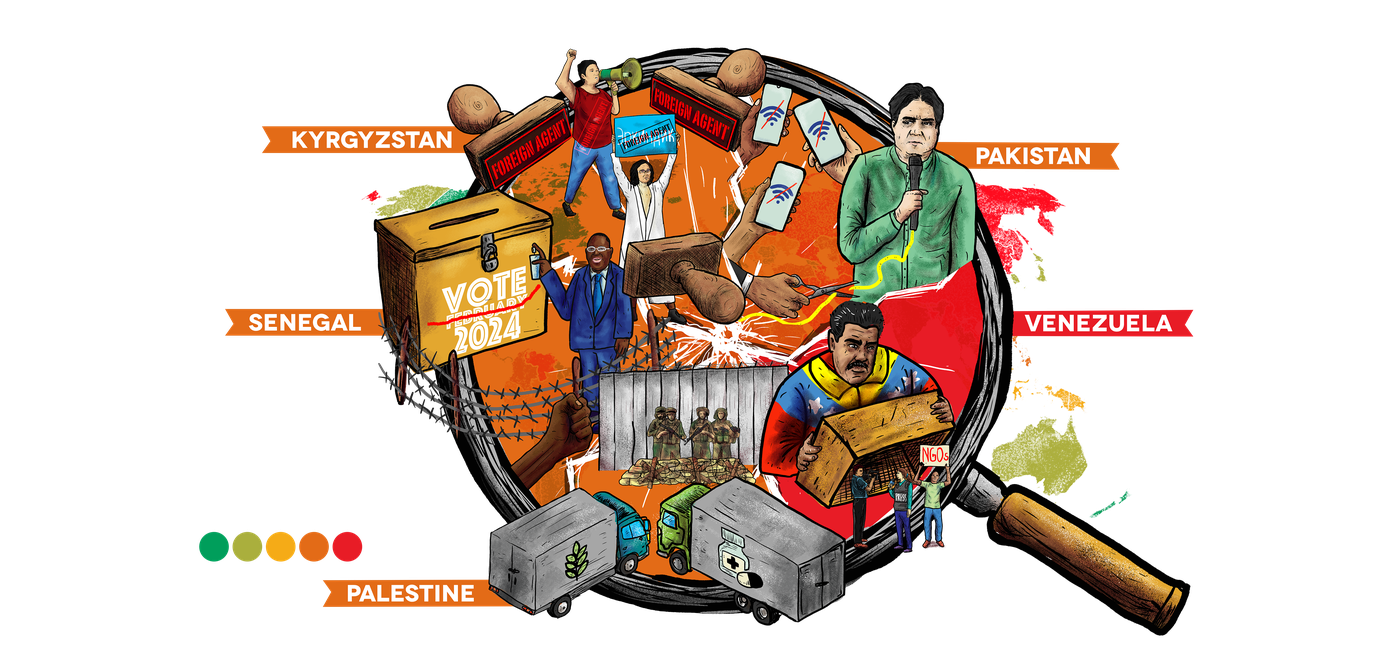
March Watchlist 2024
Latest Update: 5 March 2024 - The new CIVICUS Monitor Watchlist highlights serious concerns regarding the exercise of civic freedoms in Kyrgyzstan, Pakistan, Palestine, Senegal and Venezuela.
The Watchlist draws attention to countries where there is a serious decline in respect for civic space, based on an assessment by CIVICUS Monitor research findings, our research partners and consultations with activists on the ground.
In the coming weeks and months, the CIVICUS Monitor will closely track developments in each of these countries as part of efforts to ensure greater pressure is brought to bear on governments. CIVICUS calls upon these governments to do everything in their power to immediately end the ongoing crackdowns and ensure that perpetrators are held to account.
Descriptions of the civic space violations happening in each country are provided below. If you have information to share on civic space in any of these countries, please write to monitor@civicus.org.


In Kyrgyzstan, once considered a relative haven of civil society and media freedom in Central Asia, the government is cracking down on dissent with unprecedented severity.
Two repressive draft laws are currently making their way through Kyrgyzstan’s parliament. One is a Russian-style “foreign agent” law which, if adopted, would force non-governmental organisations funded from abroad to register as “foreign representatives” and subject them to invasive government oversight and interference. The other draft law concerns “mass media” and would impose harsh rules on media registration and content. It would also extend these restrictions to blogs and websites, further constraining internet freedom in a country where bloggers and social media users increasingly face prosecution for critical posts.
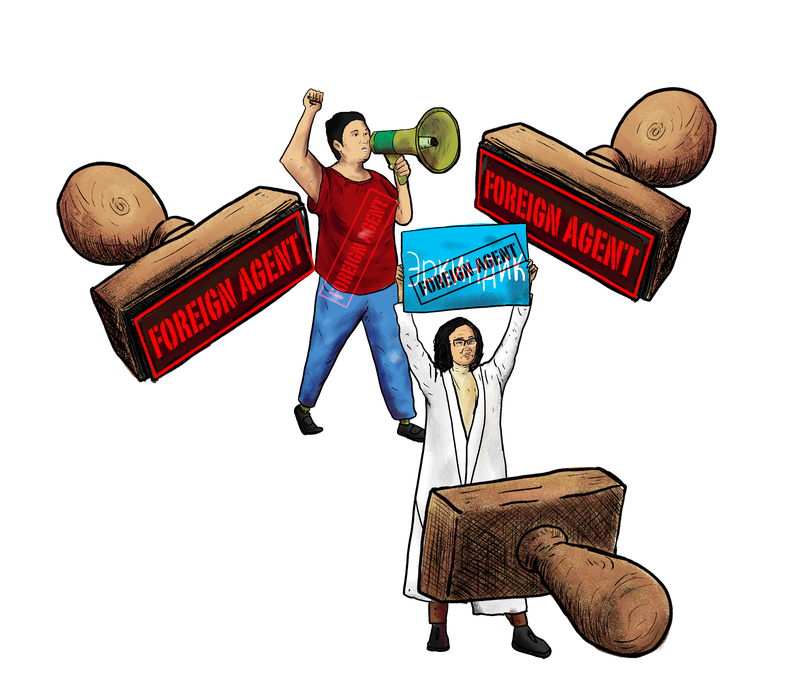
While these two laws are being debated, the authorities have stepped up their efforts to curb free expression in the country, invoking flimsy legal justifications to shut down the work of independent media. In January 2024, police and security services raided the offices of two prominent outlets, 24.KG and Temirov Live. Eleven journalists were arrested in the raid and are being held pending trial after police commissioned linguistic experts to examine their reporting and found “calls for disobedience and mass riots”. In February, a court ruled to liquidate Kloop Media, the non-profit behind the investigative portal Kloop – allegedly due to issues with its charter, but clearly in retaliation for its journalism. At the hearing, government experts testified that Kloop’s “purely negative” coverage and “harsh criticism” of the authorities was causing mental illness, sexual depravity and drug addiction among the population.
Many of the activists, journalists and public figures who were arrested in October 2022 for protesting a controversial land swap handing over control of the Kempir-Abad water reservoir to Uzbekistan remain detained while they undergo trial for “fomenting mass unrest” and “attempting to seize power by force”. The investigation and trial in this case have been shrouded in secrecy from the outset and have featured numerous procedural violations, casting doubt on their fairness and impartiality.

The lead up to the elections in Pakistan on 8 February 2024 was marred by a widespread clampdown on freedom of expression, peaceful assembly and association.
Hundreds of opposition supporters of the Pakistan Tehreek-e-Insaf (PTI) party, led by former Prime Minister Imran Khan, were detained around protests and many were charged under vague and overbroad laws. Dozens were also tried in military courts in violation of international law. The nomination of national and provincial PTI leaders was also rejected by the election commission. Pakistani media were barred from reporting Khan’s speeches or rallies on TV and the Pakistan Electronic Media Regulatory Authority (PEMRA) directed all TV channels to stop giving airtime to journalists considered close to Khan and individuals accused of criticising the military or the government.
A number of incidents of internet shutdown were reported around the elections. The authorities slowed down internet services and blocked access to major social media platforms amid online events organised by the opposition PTI. Widespread internet disruptions and mobile phone suspensions were again reported on the day of the elections.
Human rights defenders and journalists remain at risk for undertaking their work in Pakistan. In January 2023, police raided the home of woman human rights defender Hooran Baloch in Quetta, Balochistan while Sindhi political activist Hidayatullah Lohar was killed by unknown gunmen in February 2024.
The authorities also cracked down on protests by the Baloch community, campaigning around historic and ongoing violations including enforced and involuntary disappearance, extrajudicial killings, arbitrary detention and torture. Separately, leaders of the Pashtun Tahaffuz Movement (PTM), a network of activists that in recent years have mobilised nationwide against systemic discrimination and human rights violations, have also been targeted with arrest, prosecution and attacks.
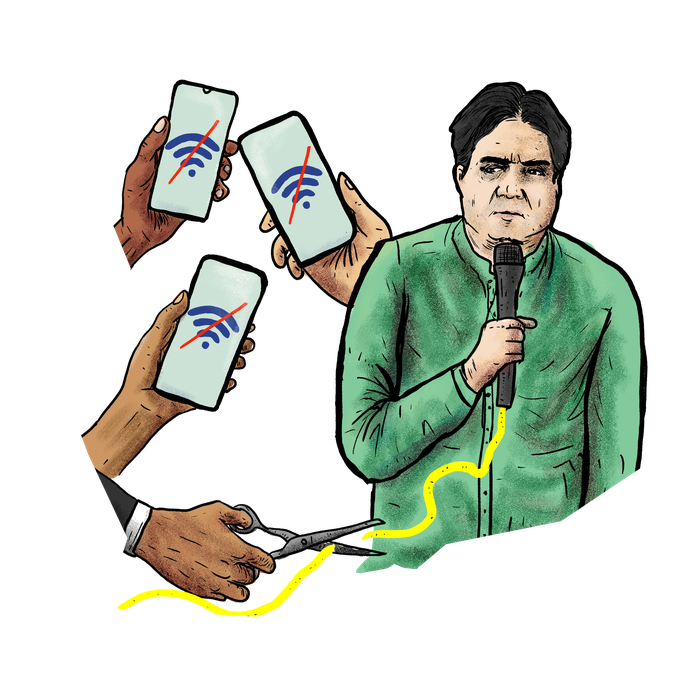

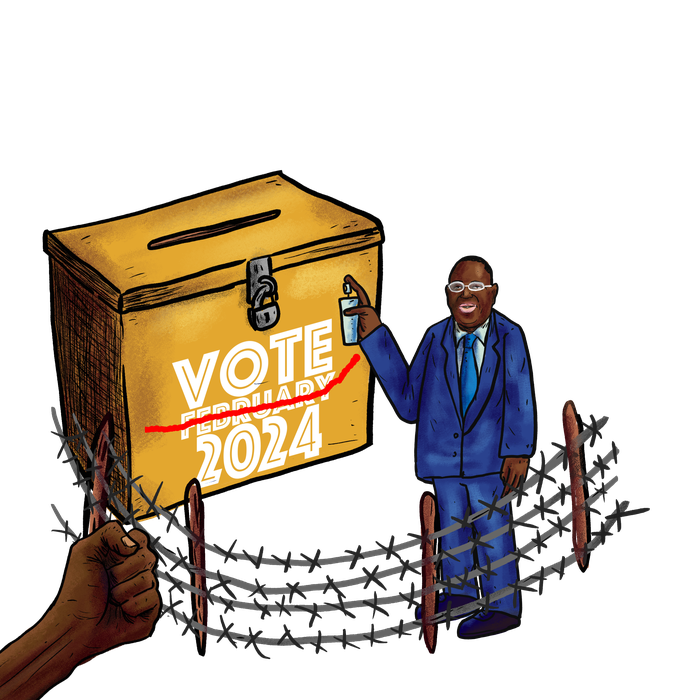
Senegal remains on the CIVICUS Monitor’s Watchlist as civic space violations and political tensions further intensified following President Sall’s announcement delaying the presidential elections.
On 3 February 2024, outgoing President Sall announced that presidential elections, slated for 25 February 2024, are to be postponed to an undetermined date, citing a conflict between the National Assembly and the Constitutional Council over the candidate list as reason for the delay. Senegal’s National Assembly voted, on 5th February 2024, to delay the elections to 15th December 2024, in a chaotic session in which opposition lawmakers attempted to block the proceedings and security forces intervened to force them off the central dais.
Protests erupted over the electoral delay, to which security forces responded with excessive use of force, including tear gas and live ammunition, killing at least three people and injuring dozens. Other civic space violations include the arrest of protesters, restrictions to the access to mobile internet, the shutdown of a media outlet, detention of and physical attacks against journalists.
Following the ruling by the Constitutional Council, on 15 February, that the decree postponing the elections was unconstitutional and therefore null and void, President Sall announced he would hold presidential elections “as soon as possible”. In an attempt to ease political tensions, hundreds of political prisoners – members of opposition, journalists and activists – were released since 15 February 2024 while civil society protests were authorised. Furthermore, President Sall announced that a bill, granting amnesty for acts related to political demonstrations since March 2021, will be proposed to the National Assembly as to create a conducive environment for the electoral process. It is yet to be seen whether fair and transparent elections will be held in a timely matter, to further ease tensions.
Senegal was first added to the CIVICUS Monitor Watchlist in September 2023 due to the deterioration of civic space ahead of the presidential elections. Civic space violations have included the arbitrary detention of journalists, protesters and activists, crackdown on opposition protests, suspension of media outlets, the dissolution of opposition party PASTEF and restrictions to the access to the internet. In December 2023, Senegal’s civic space rating was downgraded from Obstructed to Repressed as civic space conditions deteriorated significantly.

In a context of a complex humanitarian emergency and heightened political tension, several censorship mechanisms have been deployed as part of a strategy to persecute human rights defenders (HRDs) and limit speech criticising the government. On 9 February 2024, human rights defender Rocío San Miguel was arbitrarily detained along with five of her relatives by the General Directorate of Military Counterintelligence (DGCIM) at the Simón Bolívar International Airport. On 15 February, Venezuelan authorities declared that San Miguel was in the custody of the Bolivarian National Intelligence Service (SEBIN) at ‘El Helicoide’ detention centre in Caracas, on charges of treason, conspiracy, terrorism and association, following the decision of the Second Court Against Terrorism. During this period, she has been subjected to incommunicado detention.
On 14 February, the Attorney General, Tarek William Saab, declared that those who denounce San Miguel’s enforced disappearance are committing a crime, and that HRDs and CSOs are actively working against the government. Moreover, after the UN Human Rights Office of the High Commissioner (OHCHR) expressed concern regarding the detention of San Miguel, on 15 February, the Venezuelan government announced it was suspending the activities of the OHCHR in the country and giving its staff 72 hours to leave after accusing the office of promoting opposition.
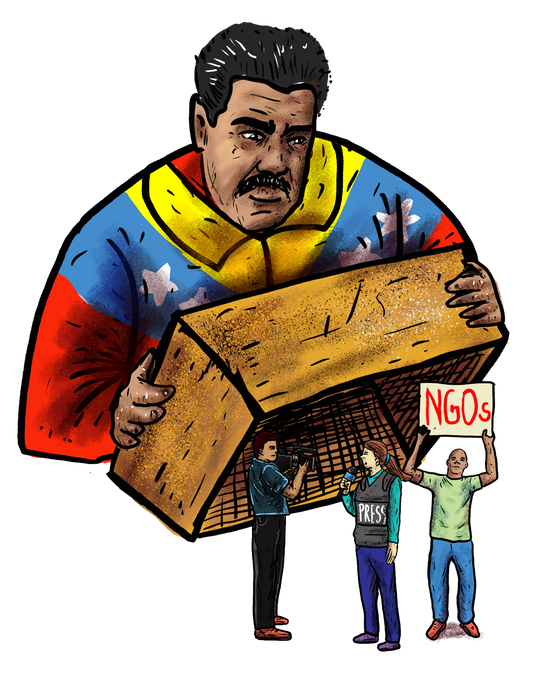
On 14 February, the Attorney General, Tarek William Saab, declared that those who denounce San Miguel’s enforced disappearance are committing a crime, and that HRDs and CSOs are actively working against the government. Moreover, after the UN Human Rights Office of the High Commissioner (OHCHR) expressed concern regarding the detention of San Miguel, on 15 February, the Venezuelan government announced it was suspending the activities of the OHCHR in the country and giving its staff 72 hours to leave after accusing the office of promoting opposition.
On 12 January 2024, the National Assembly resumed the debate of the draft bill on ‘Law on Control, Regulation, Performance and Financing of Non-Governmental and Related Organisations (draft NGO law).’ If enacted, this law would seriously hinder the freedom of association.

Since 7th October 2023, when Hamas forces launched an unprecedented attack on Israel, which was followed by a devastating and brutal military offensive by Israel that has since ensued in Gaza, more than 1,200 Israelis and foreign nationals in Israel have been killed and more than 28,000 Palestinians in Gaza, the majority of them civilians, with at least 67,600 injuries to Palestinians being reported as of February 2024. Gaza is now in the throes of a massive humanitarian catastrophe, with an alarming 75% of its population—approximately 1.7 million people—now forcibly displaced from their homes. The World Health Organisation has issued a dire alert, highlighting that the population is starving to death.
Despite this dire humanitarian situation, the suspension of funding to a number of civil society organisations and the UN Relief and Works Agency for Palestine Refugees in the Near East (UNRWA) threatens to cripple humanitarian efforts, exacerbating the risk of starvation, famine and the delivery of essential services. Despite immediate actions to address allegations that a select number of employees at the UN agency were involved in the 7 October 2023 Hamas attack, at least eighteen countries have suspended funding to UNRWA which provides vital aid to millions of Palestinian refugees.
Separately, humanitarian organisations seeking to provide much needed assistance to the civilian population in Gaza are facing significant challenges to their operations. Between 1 January 2024 and 12 February 2024, humanitarian organisations scheduled 77 missions to provide aid and conduct assessments in areas north of Wadi Gaza. Among these, Israeli authorities facilitated 12, partially facilitated three, impeded 14 and denied access to 39, while nine were postponed by the agencies. Israeli citizens have also been gathering to block aid trucks from reaching Gaza.
Humanitarian workers, bravely facing the risks at the frontline to serve millions of displaced Palestinians, are paying the ultimate price because of their work. By 15 February 2024, at least 158 UN staff members had been killed in Gaza since 7 October 2023, the highest number of UN aid workers to have been killed in any single conflict in the organisation’s history.
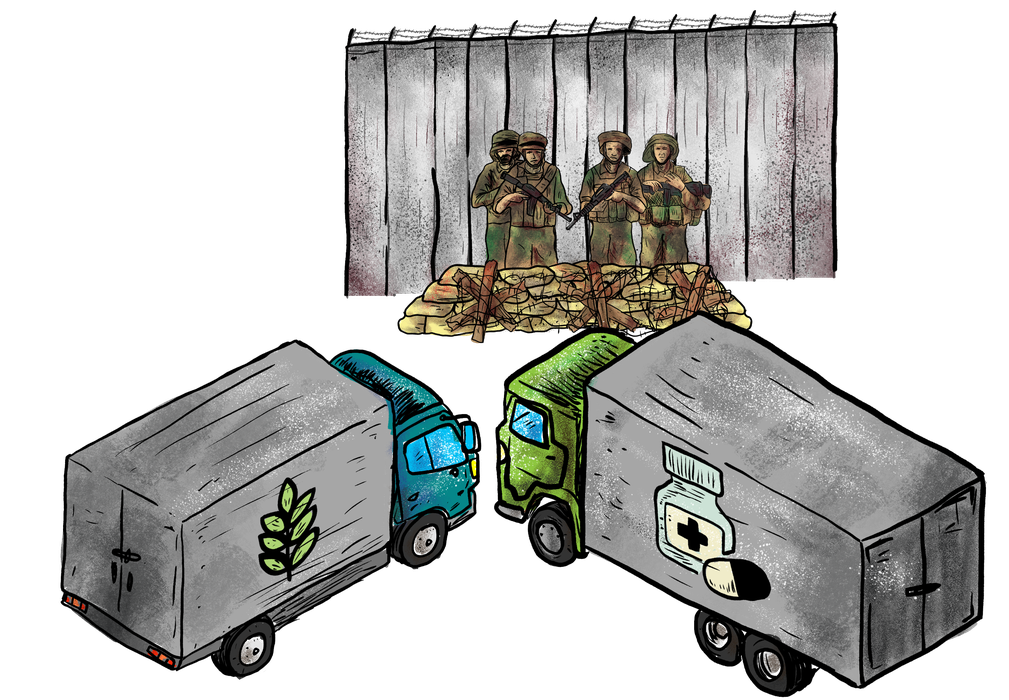
Similarly, journalists and media workers are also bearing much of the brunt as many continue to pay the ultimate price because of their brave work that puts them at the frontline of the conflict. By 13 February 2024, the committee to Protect Journalists (CPJ) documented that at least 85 journalists and media workers had been killed since 7 October 2023, 16 journalists were reported injured, 4 journalists were reported missing and 25 journalists arrested.
Recurring telecommunications blackouts in the Gaza strip have also been jeopardising the safety of civilians, journalists and aid workers by inhibiting access to critical and lifesaving information, while also undermining humanitarian aid operations.
Finally, the offices of CSOs, including humanitarian organisations, are facing indiscriminate and sometimes deliberate destruction. Médecins du Monde (MdM) condemned what they described as the deliberate destruction of its offices in Gaza while the Medical Aid for Palestine (MAP) and the International Rescue Committee (IRC) reported incidents affecting their offices resulting from the indiscriminate decimation of infrastructure by Israel in Gaza. By 15 February 2024, UNRWA had also reported at least 321 incidents affecting their facilities.

